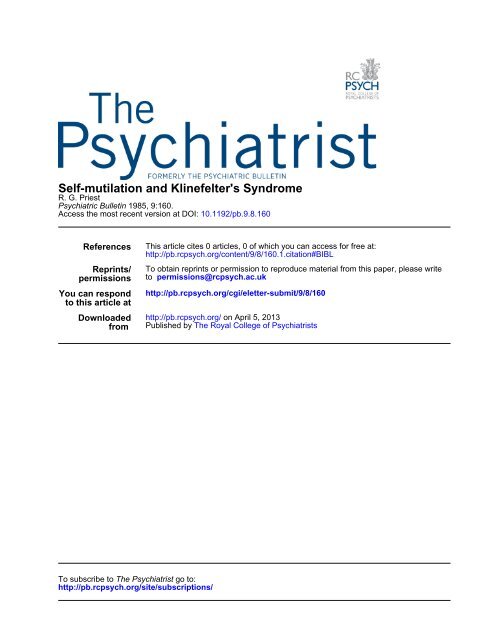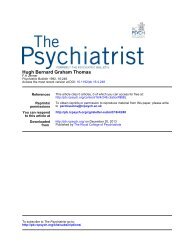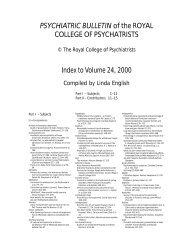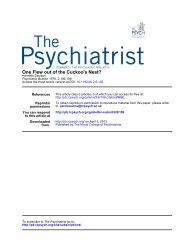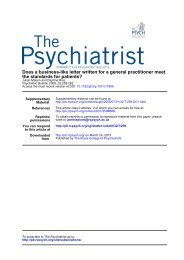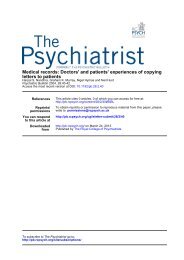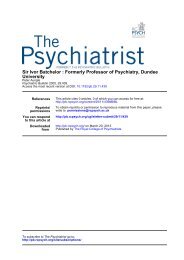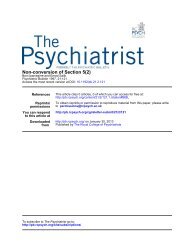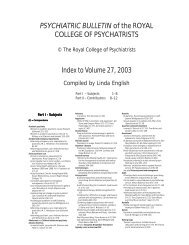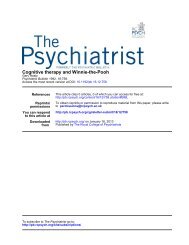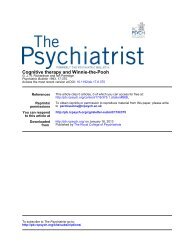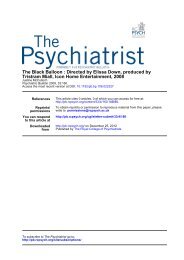Self-mutilation and Klinefelter's Syndrome Italian ... - The Psychiatrist
Self-mutilation and Klinefelter's Syndrome Italian ... - The Psychiatrist
Self-mutilation and Klinefelter's Syndrome Italian ... - The Psychiatrist
You also want an ePaper? Increase the reach of your titles
YUMPU automatically turns print PDFs into web optimized ePapers that Google loves.
<strong>Self</strong>-<strong>mutilation</strong> <strong>and</strong> <strong>Klinefelter's</strong> <strong>Syndrome</strong><br />
R. G. Priest<br />
Psychiatric Bulletin 1985, 9:160.<br />
Access the most recent version at DOI: 10.1192/pb.9.8.160<br />
References<br />
Reprints/<br />
permissions<br />
This article cites 0 articles, 0 of which you can access for free at:<br />
http://pb.rcpsych.org/content/9/8/160.1.citation#BIBL<br />
To obtain reprints or permission to reproduce material from this paper, please write<br />
to permissions@rcpsych.ac.uk<br />
You can respond http://pb.rcpsych.org/cgi/eletter-submit/9/8/160<br />
to this article at<br />
Downloaded<br />
from<br />
To subscribe to<br />
<strong>The</strong> <strong>Psychiatrist</strong> go to:<br />
http://pb.rcpsych.org/site/subscriptions/<br />
http://pb.rcpsych.org/ on April 5, 2013<br />
Published by <strong>The</strong> Royal College of <strong>Psychiatrist</strong>s
160 BULLETIN OF THE ROYAL COLLEGE OF PSYCHIATRISTS, VOL 9, AUGUST 1985<br />
they provide 152 beds for the short- <strong>and</strong> long-term care of the<br />
mentally h<strong>and</strong>icapped in Rotherham. which has a population<br />
of 255,000. <strong>The</strong> Local Authority Social Service has few hostels<br />
<strong>and</strong> group homes which together offer a total of less than five<br />
short-term care places. <strong>The</strong> weekend respite care does a lot of<br />
good to parents, but what does it do to the h<strong>and</strong>icapped<br />
person, the recipient?<br />
<strong>The</strong> h<strong>and</strong>icapped person may find himself in a strange ward<br />
if the weekend respite has not been booked in advance, or if<br />
no bed was available in the usual ward by the time the request<br />
is made. He is in on Friday <strong>and</strong> out on Monday. During this<br />
time he would daily have come across, at the least, three<br />
different care givers <strong>and</strong> put up with many other clients, some<br />
worse than himself in terms of self-care skills, behaviour <strong>and</strong><br />
the degree of physical h<strong>and</strong>icap. <strong>The</strong>re is just the time to<br />
scrutinize the environment, learn a few of its rules <strong>and</strong> adapt,<br />
<strong>and</strong> then it is 'goodbye'. <strong>The</strong> chances are he may have seen no<br />
doctor, had no physical examination or a routine clinical<br />
investigation. His admission is for a social reason: 'the bed <strong>and</strong><br />
breakfast use of the hospital', as some call it.<br />
<strong>The</strong> weekend respite does something to the consultant also.<br />
<strong>The</strong> consultant or the doctor in charge of the Unit is left in a<br />
dilemma. In Rotherham, most of these admissions are<br />
arranged between the community nurse <strong>and</strong> parents. Medical<br />
secretaries book them in liaison with social workers <strong>and</strong> com<br />
munity nurses in a few other places I know of. For days after<br />
their discharge, the consultant may not know of the clients<br />
who have been in for the weekend respite. This is particularly<br />
true when there are no junior doctors or when the client is on<br />
no medication. Should there be a cause for litigation for<br />
negligence during the respite care, or an unidentified diabetic<br />
who goes into a coma soon after discharge on Monday morn<br />
ing, who takes the responsibility?<br />
In the above instance, the client was in a hospital <strong>and</strong> under<br />
a consultant, at least, on the HMRI (DHSS Return Form).<br />
Should the same happen in a Social Services hostel or in a<br />
family home accepting h<strong>and</strong>icapped persons for weekend<br />
respite care, the judgement of the public or of a coroner would<br />
certainly be different.<br />
<strong>The</strong>re is a need for the transfer of the weekend respite care<br />
to selected <strong>and</strong> willing families. <strong>The</strong> receiver of the care, by<br />
constantly using the same family, may st<strong>and</strong> to gain more<br />
benefits. Well staffed small units in Local Authority Social<br />
Service hostels may be a second choice, especially where the<br />
degree of h<strong>and</strong>icap is not severe. As for the hospital <strong>and</strong><br />
hostels, short-term admissions for assessment, treatment,<br />
training <strong>and</strong> other respite should continue to be available for<br />
the mentally h<strong>and</strong>icapped.<br />
In terms of cost effectiveness, the suggested transfer may<br />
not be cheaper; but the h<strong>and</strong>icapped person will st<strong>and</strong> to gain,<br />
his parents breathing space still assured. But until then, some<br />
consultants will continue to live with their dilemma. I would<br />
welcome comments from colleagues.<br />
B. N. NWULU<br />
Beechcroft<br />
Oakwood<br />
Moorgate Road, Rotherham<br />
<strong>Self</strong>-<strong>mutilation</strong> <strong>and</strong> <strong>Klinefelter's</strong> <strong>Syndrome</strong><br />
DEAR SIRS<br />
In his recent letter (Bulletin, April 1985, 9, 83), Dr Michael<br />
Simpson, writing from Durban, seems to be rather peeved<br />
that you are giving space to the correspondence on this sub<br />
ject, to the extent that he asks: 'Why are we discussing this<br />
combination at all?'<br />
I presume that he is not really suggesting that you. Sirs,<br />
should attempt to censor scientific discussion. My sense is that<br />
he is implying that this combination could have arisen by<br />
chance. Of course, this is one of the null hypotheses that my<br />
colleagues <strong>and</strong> I would like to test eventually by inferential<br />
statistics in the conventional way (Siegel1). However, we are<br />
still at the descriptive stage of scientific enquiry, rather than at<br />
the hypothesis testing stage.<br />
One of the advantages of having the courtesy of your<br />
columns is that we are now able to contact all those who are<br />
writing in with further examples. Drs Stawski <strong>and</strong> Farmer<br />
from this department are approaching the correspondents<br />
with a systematic list of questions about the characteristics of<br />
the patients they have reported. I hope that this revelation will<br />
not prevent others from writing in! <strong>The</strong> answers will then<br />
enable us to formulate more precise hypotheses for the statis<br />
tical analysis.<br />
Your readers could be of assistance in a further way. I am<br />
not sure what the exact base rates of prevalence are for<br />
<strong>Klinefelter's</strong> <strong>Syndrome</strong>, <strong>and</strong> still less for self-multilation. If<br />
anyone could help us with figures for these frequencies it<br />
would help enormously.<br />
R. G. PRIEST<br />
Si Mary's Hospital<br />
London W2<br />
REFERENCE<br />
'SIEGEL,S. (1956) Nonparametric Statistics for the Behavioral Sciences.<br />
New York: McGraw Hill.<br />
<strong>Italian</strong> psychiatry<br />
DEAR SIRS<br />
Italy must have a very different pattern of psychiatric disturb<br />
ance to that in Britain. I assume from Dr Johl's article (Bul<br />
letin, April 1985, 9, 73-74) that psychosis does not occur, <strong>and</strong><br />
that until liberated by Law No 180, <strong>Italian</strong> mental hospitals<br />
were entirely filled with unjustifiably detained patients with<br />
non-psychotic disturbances. If this was the case, then 'Demo<br />
cratic Psychiatry' with its emphasis on self-determination <strong>and</strong><br />
its lack of reliance on drugs, is to be welcomed.<br />
I suspect, however, that mental illness occurs in Italy just as<br />
frequently as it occurs here. <strong>The</strong> fallacy exemplified by Dr<br />
Johl's article is to treat all forms of psychological disturbance<br />
as one <strong>and</strong> from that premise to argue for a single approach to<br />
psychiatric treatment. Dr Johl clearly favours sociological<br />
reductionism over biological reductionism, equating the<br />
former with democracy, humanitarianism <strong>and</strong> libertanianism<br />
<strong>and</strong> the latter with professional domination <strong>and</strong> repression.<br />
Perhaps I am suffering from 'false consciousness' or have<br />
been indoctrinated by the medical profession, but I am unable


